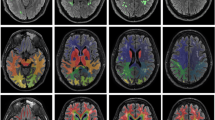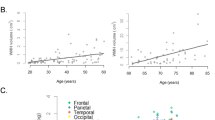Abstract
Cerebrovascular disease is an independent risk factor for dementia that may also be synergistic with Alzheimer’s disease. In recent years attention has switched from cerebral infarcts to microvascular disease as the primary cause of cerebrovascular cognitive decline, with damage to the white matter the primary mechanism. Uncertainties remain regarding the risks posed by different types vascular threat, the extent to which cerebrovascular damage occurs in middle age, and whether relatively “normal” amounts of white matter damage are accompanied by meaningful degrees of cognitive decline. We explored these issues via laboratory, cardiovascular, cognitive, and magnetic resonance imaging (MRI) data in 67 middle-aged cognitively normal offspring of dementia patients. The sample was enriched for vascular risk. Plasma insulin, 24-h systolic blood pressure, body mass index, age, and % small dense LDL cholesterol were the strongest correlates of MRI white matter hyperintensity (WMH) volume. With shared variance controlled for, 24 h systolic BP, plasma insulin, and age remained as significant predictors of WMH volume. An interaction variable (24 h BP * insulin) did not improve the prediction of WMH. WMH volume correlated negatively with cognition. No evidence for an ApoE ε4 effect emerged for either WMH or cognition. Hypertension and hyperinsulinemia appear to pose independent, consequential threats to the cerebral small vessel vasculature in middle age, reflected in the presence of areas of WMH on MRI scans. Our data show that even modest WMH volumes in middle age are associated with cognitive decrement, underscoring the importance of aggressive treatment and lifestyle modifications to address vascular risk throughout adulthood.

Similar content being viewed by others
References
Baron RM, Kenny DA (1986) The moderator-mediator variable distinction in social psychological research: conceptual, strategic, and statistical considerations. J Pers Soc Psychol 51:1173–1182
Beeri MS et al (2008) Insulin in combination with other diabetes medication is associated with less Alzheimer neuropathology. Neurology 71:750–757. doi:10.1212/01.wnl.0000324925.95210.6d
van den Berg E, Kloppenborg RP, Kessels RP, Kappelle LJ, Biessels GJ (2009) Type 2 diabetes mellitus, hypertension, dyslipidemia and obesity: a systematic comparison of their impact on cognition. Biochim Biophys Acta 1792:470–481. doi:10.1016/j.bbadis.2008.09.004
Craft S, Cholerton B, Baker LD (2013) Insulin and Alzheimer's disease: untangling the web. J Alzheimers Dis 33(Suppl 1):S263–S275. doi:10.3233/JAD-2012-129042
Crisby M, Bronge L, Wahlund LO (2010) Low levels of high density lipoprotein increase the severity of cerebral white matter changes: implications for prevention and treatment of cerebrovascular diseases. Curr Alzheimer Res 7:534–539
Debette S (2013) Vascular risk factors and cognitive disorders. Rev Neurol (Paris) 169:757–764. doi:10.1016/j.neurol.2013.07.022
Faraco G, Iadecola C (2013) Hypertension: a harbinger of stroke and dementia. Hypertension 62:810–817. doi:10.1161/HYPERTENSIONAHA.113.01063
Galvin JE et al (2005) The AD8: a brief informant interview to detect dementia. Neurology 65:559–564. doi:10.1212/01.wnl.0000172958.95282.2a
Geda YE et al (2010) Physical exercise, aging, and mild cognitive impairment: a population-based study. Arch Neurol 67:80–86. doi:10.1001/archneurol.2009.297
Godin O, Tzourio C, Maillard P, Mazoyer B, Dufouil C (2011) Antihypertensive treatment and change in blood pressure are associated with the progression of white matter lesion volumes: the Three-City (3C)-Dijon magnetic resonance imaging study. Circulation 123:266–273. doi:10.1161/CIRCULATIONAHA.110.961052
Gustafson D, Rothenberg E, Blennow K, Steen B, Skoog I (2003) An 18-year follow-up of overweight and risk of Alzheimer disease. Arch Intern Med 163:1524–1528. doi:10.1001/archinte.163.13.1524
Iadecola C (2013) The pathobiology of vascular dementia. Neuron 80:844–866. doi:10.1016/j.neuron.2013.10.008
Kivipelto M et al (2005) Obesity and vascular risk factors at midlife and the risk of dementia and Alzheimer disease. Arch Neurol 62:1556–1560. doi:10.1001/archneur.62.10.1556
Knopman DS, Mosley TH, Catellier DJ, Sharrett AR (2005) Cardiovascular risk factors and cerebral atrophy in a middle-aged cohort. Neurology 65:876–881
Knopman DS, Mosley TH, Catellier DJ, Coker LH (2009) Fourteen-year longitudinal study of vascular risk factors, APOE genotype, and cognition: the ARIC MRI study Alzheimers. Dement 5:207–214
Kraemer HC, Wilson GT, Fairburn CG, Agras WS (2002) Mediators and moderators of treatment effects in randomized clinical trials. Arch Gen Psychiatry 59:877–883
Lamarche B, Lemieux I, Despres JP (1999) The small, dense LDL phenotype and the risk of coronary heart disease: epidemiology, patho-physiology and therapeutic aspects. Diabetes metab 25:199–211
Launer LJ, Ross GW, Petrovitch H, Masaki K, Foley D, White LR, Havlik RJ (2000) Midlife blood pressure and dementia: the Honolulu-Asia aging study. Neurobiol Aging 21:49–55
Maillard P et al (2012) Effects of systolic blood pressure on white-matter integrity in young adults in the Framingham heart study: a cross-sectional study. Lancet Neurol 11:1039–1047. doi:10.1016/S1474-4422(12)70241-7
Miller CK, Edwards L, Kissling G, Sanville L (2002a) Evaluation of a theory-based nutrition intervention for older adults with diabetes mellitus. J Am Diet Assoc 102:1069–1081
Miller CK, Edwards L, Kissling G, Sanville L (2002b) Nutrition education improves metabolic outcomes among older adults with diabetes mellitus: results from a randomized controlled trial. Prev Med 34:252–259. doi:10.1006/pmed.2001.0985
de la Monte SM (2012) Brain insulin resistance and deficiency as therapeutic targets in Alzheimer's disease. Curr Alzheimer Res 9:35–66
Nelson PT et al (2009) Human cerebral neuropathology of type 2 diabetes mellitus. Biochim Biophys Acta 1792:454–469. doi:10.1016/j.bbadis.2008.08.005
O'Brien E et al (2013) European Society of Hypertension position paper on ambulatory blood pressure monitoring. J Hypertens 31:1731–1768. doi:10.1097/HJH.0b013e328363e964
Peppa M, Uribarri J, Vlassara H (2002) Advanced glycoxidation. A new risk factor for cardiovascular disease? Cardiovasc Toxicol 2:275–287
Peppa M, Uribarri J, Vlassara H (2003) Glucose, advanced glycation end products, and diabetes complications: what is new and what works. Clinical Diabetes 21:186–187
Prins ND, Scheltens P (2015) White matter hyperintensities, cognitive impairment and dementia: an update. Nat Rev Neurol 11:157–165. doi:10.1038/nrneurol.2015.10
Roberts RO, Knopman DS, Geda YE, Cha RH, Roger VL, Petersen RC (2010) Coronary heart disease is associated with non-amnestic mild cognitive impairment. Neurobiol Aging 31:1894–1902. doi:10.1016/j.neurobiolaging.2008.10.018
Roriz-Filho JS et al (2009) (pre)diabetes, brain aging, and cognition. Biochim Biophys Acta 1792:432–443. doi:10.1016/j.bbadis.2008.12.003
Rosenberg GA et al (2015) Consensus statement for diagnosis of subcortical small vessel disease. J Cereb Blood Flow Metab. doi:10.1038/jcbfm.2015.172
Sarafidis PA, Nilsson PM (2006) The metabolic syndrome: a glance at its history. J Hypertens 24:621–626. doi:10.1097/01.hjh.0000217840.26971.b6
Schilling S et al (2013) APOE genotype and MRI markers of cerebrovascular disease: systematic review and meta-analysis. Neurology 81:292–300. doi:10.1212/WNL.0b013e31829bfda4
Schmidt P et al (2012) An automated tool for detection of FLAIR-hyperintense white-matter lesions in multiple sclerosis. NeuroImage 59:3774–3783. doi:10.1016/j.neuroimage.2011.11.032
Shanik MH, Xu Y, Skrha J, Dankner R, Zick Y, Roth J (2008) Insulin resistance and hyperinsulinemia: is hyperinsulinemia the cart or the horse? Diabetes Care 31(Suppl 2):S262–S268. doi:10.2337/dc08-s264
Shapiro AM, Benedict RH, Schretlen D, Brandt J (1999) Construct and concurrent validity of the Hopkins verbal learning test-revised. Clin Neuropsychol 13:348–358
Shen BJ, Todaro JF, Niaura R, McCaffery JM, Zhang J, Spiro A 3rd, Ward KD (2003) Are metabolic risk factors one unified syndrome? Modeling the structure of the metabolic syndrome X. Am J Epidemiol 157:701–711
Skoog I, Gustafson D (2006) Update on hypertension and Alzheimer's disease. Neurol Res 28:605–611. doi:10.1179/016164106X130506
Solomon A, Kivipelto M (2009) Cholesterol-modifying strategies for Alzheimer's disease. Expert Rev Neurother 9:695–709. doi:10.1586/ern.09.25
Solomon A et al (2009a) Serum total cholesterol, statins and cognition in non-demented elderly. Neurobiol Aging 30:1006–1009. doi:10.1016/j.neurobiolaging.2007.09.012
Solomon A, Kivipelto M, Wolozin B, Zhou J, Whitmer RA (2009b) Midlife serum cholesterol and increased risk of Alzheimer's and vascular dementia three decades later. Dement Geriatr Cogn Disord 28:75–80. doi:10.1159/000231980
Strauss E, Sherman EMS, Spreen O (2006) A compendium of neuropsychological tests : administration, norms, and commentary. 3rd edn. Oxford University Press, New York
Teng EL, Chui HC (1987) The modified mini-mental state (3MS) examination. The Journal of clinical psychiatry 48:314–318
Tsivgoulis G et al (2009) Association of higher diastolic blood pressure levels with cognitive impairment. Neurology 73:589–595. doi:10.1212/WNL.0b013e3181b38969
Tzourio C, Laurent S, Debette S (2014) Is hypertension associated with an accelerated aging of the brain? Hypertension 63:894–903. doi:10.1161/HYPERTENSIONAHA.113.00147
Wardlaw JM, Valdes Hernandez MC, Munoz-Maniega S (2015) What are white matter hyperintensities made of? Relevance to vascular cognitive impairment. J Am Heart Assoc 4:001140. doi:10.1161/JAHA.114.001140
Wechsler D (2008) Wechsler adult intelligence scale-fourth edition (WAIS-IV). Pearson, San Antonio
Whitmer RA, Gunderson EP, Barrett-Connor E, Quesenberry CP Jr, Yaffe K (2005) Obesity in middle age and future risk of dementia: a 27 year longitudinal population based study. BMJ 330:1360. doi:10.1136/bmj.38446.466238.E0
Whitmer RA, Gunderson EP, Quesenberry CP Jr, Zhou J, Yaffe K (2007) Body mass index in midlife and risk of Alzheimer disease and vascular dementia. Curr Alzheimer Res 4:103–109
Whitmer RA, Gustafson DR, Barrett-Connor E, Haan MN, Gunderson EP, Yaffe K (2008) Central obesity and increased risk of dementia more than three decades later. Neurology 71:1057–1064. doi:10.1212/01.wnl.0000306313.89165.ef
Author information
Authors and Affiliations
Corresponding author
Ethics declarations
The institutional review boards of Hartford Hospital and Yale University approved the study, the study protocol, and the informed consent process. All subjects provided written informed consent.
Funding support
Hartford Hospital Corporation research grant BLAN003877 to Karen Blank, M.D., Principal Investigator.
Rights and permissions
About this article
Cite this article
Hawkins, K.A., Emadi, N., Pearlson, G.D. et al. Hyperinsulinemia and elevated systolic blood pressure independently predict white matter hyperintensities with associated cognitive decrement in the middle-aged offspring of dementia patients. Metab Brain Dis 32, 849–857 (2017). https://doi.org/10.1007/s11011-017-9980-9
Received:
Accepted:
Published:
Issue Date:
DOI: https://doi.org/10.1007/s11011-017-9980-9




